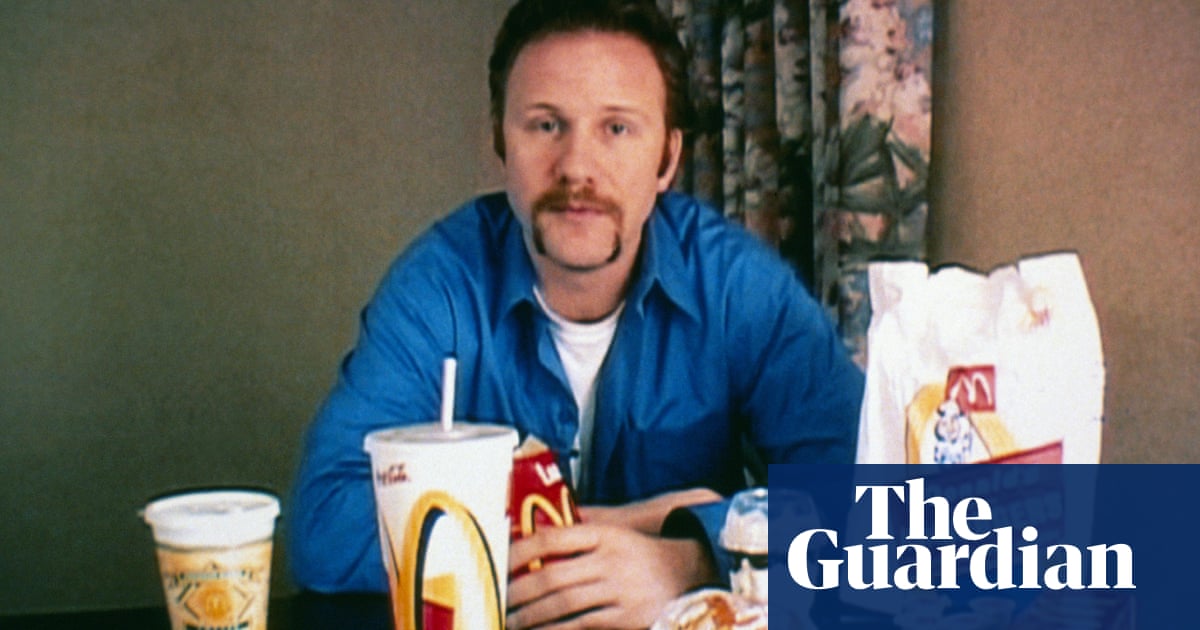
When a person shuffles off their mortal coil, they count themselves lucky to have some quantifiable or tangible expression of their legacy – an accomplishment more expansively influential than raising a single child or creating a body of work. In the case of documentarian Morgan Spurlock, who died this week from cancer-related health complications, it would not be exaggeration to claim that he singlehandedly killed the super-sized meal at McDonald’s.
Cashiers at America’s favorite fast-food chain stopped offering customers mega portions for mini charges six weeks after the Sundance film festival premiere of Spurlock’s 2004 exposé Super Size Me, which added an epilogue title card saying so by the time it went wide to theaters in May. Spurlock’s kamikaze experiment in gustation – to spend 30 days subsisting on nothing but gargantuan quantities of foodstuffs from the house Ronald McDonald built – began to turn the tide of public opinion against the short-order burger shacks theretofore cherished as a key plank of America’s culinary heritage. His argument likened the Big Mac to big tobacco, a vice far too addictive to resist as it wreaked havoc on our health. There’s a view of the 21st century that sees Spurlock’s crack reportage as the point A leading us to our present point B of fresher salads, listed calorie counts and plant-based alternatives to meat.
Super Size Me arrived in the thick of the Dubya administration’s first term, and everything was indeed bigger under the Texan, gas-guzzler SUVs claimed by rightwingers as a patriotic symbol. This thinking also extended to dietary choices, the right to obesity – declared an epidemic by the US surgeon general, language in common use ever since – defended as an inviolable proof of consumer choice in the free market. The business model of McDonald’s capitalized on this national attitude in some pretty predatory ways, from the colorful mascots that establish an emotional link in impressionable youths, to the chemical agents that artificially jack up the brain’s happy chemicals with each bite. These forces needed a robust opposition, and Spurlock gave them one, rendering the gradual effects of irresponsible eating startlingly visible by condensing them to feature length. Before our very eyes, we can watch not just as his waistline expands, but as his mental health precipitously deteriorates until he’s talking like a crack addict fiending for his morning fix.
In the years since Spurlock lobbed his stick of dynamite into the drive-thru, it’s become a staple of classroom viewing for biology teachers with a bit of grading to get done. Academics taking a more studied inspection of the film’s engagement with the scientific method have found its rigor lacking, however. It’s hardly breaking news that someone ingesting herculean quantities of high-fat food without any exercise beyond the average person’s daily movements of 5,000 steps will face grim consequences, and Spurlock didn’t help his own case by refusing to release a public log of his intake. (The eventual disclosure that he was also drinking heavily during this time further compromised his already vague findings.) Detractors charged the director with trying to have it both ways, claiming the import of research while holding himself to the standard of entertainment.
And insofar as Super Size Me existed to counter conservative party lines, the film also affirmed some uncharitable liberal biases. Starting with the poster, which stuffs the mouth of a mugging Spurlock with a fistful of fries, the scare tactics rely on the widespread hatred of fat people and fear that anyone can join their ranks without constant vigilance. More precisely, the essence of the project props up the Democrats’ paternalist reflex to regard the impoverished as too helplessly uneducated to make decisions for themselves. The thesis lacks in systemic perspective, framing the purchase of every value meal as a personal decision rather than interrogating the economic factors that make McDonald’s such a ubiquitous presence in low-income neighborhoods. Though the term “food deserts” wouldn’t enter the common lexicon for another several years, it now sticks out as the major structuring absence in an analysis more preoccupied with the nasty immediacy of the what than the complex hows and whys.
The criticism that Spurlock undermines his worthy inquests by foregrounding his own showman flash would follow him for the rest of his career, including the 2017 Super Size Me sequel that saw him tackle the chicken-industrial complex by creating a three-ring circus around his self-started KFC knock-off. However flawed his methodologies, however distracted his film-making techniques, Spurlock was able to command mainstream attention for his work by imperfectly addressing pressing issues not yet taken for granted as subjects of debate. While he never bested the golden-arched Goliath, he went a way toward cementing their image as villains in our collective imagination. For his many shortcomings, Spurlock still laid bare the cruel truth underlying all capitalism: a corporation will always care about getting our money more than it cares whether we live or die.
Super Size Me: the film that sounded a fast-food alarm in America - The Guardian
Read More
No comments:
Post a Comment